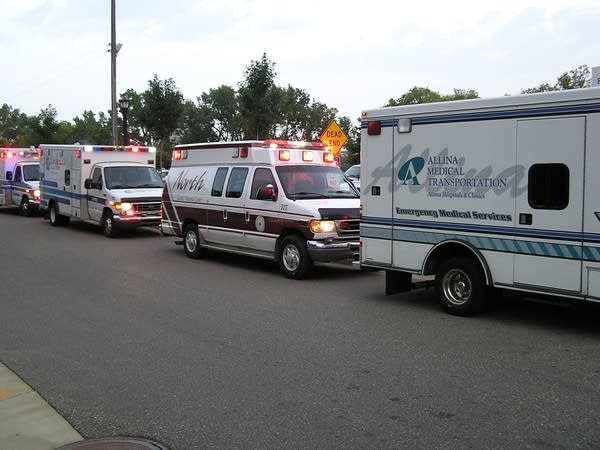Emergency plans pay off

Emergency responders have drilled over and over again for just this type of situation, even though they hoped it would never come.
The Minnesota State Patrol and emergency personnel from several metro area cities converged on the disaster site just minutes after the bridge collapsed.
Fire personnel from Anoka, state SUVs hauling emergency boats and the Minnesota State Patrol were just a few of the emergency crews who worked the scene.
Mark Dunaski, chief of the Minnesota State Patrol, watched the disaster response from the north side of the river -- just 200 yards from the pancaked bridge. He was confident that emergency responders would handle the disaster well.
Create a More Connected Minnesota
MPR News is your trusted resource for the news you need. With your support, MPR News brings accessible, courageous journalism and authentic conversation to everyone - free of paywalls and barriers. Your gift makes a difference.
"The state of Minnesota gets things very well set up," he said. "The state of Minnesota's emergency operations center is being opened right now. The local hospitals have been notified. I'm sure that they're recalling staff at this time as well. This is something that Minnesota prepares for very well. As tragic as the situation is, we do a pretty good job of responding to these situations."
As Dunaski and other members of the State Patrol managed crowd control and traffic from atop the bridge, divers searched for survivors. Rescue boats ferried crews and equipment across the Mississippi and firefighters extinguished a car fire on the remaining part of the bridge.
Far below, other cars were crushed and a portion of the bridge collapsed on a train, squashing the rail car like an aluminum can.
Local hospitals say they treated dozens upon dozens of patients.
Minneapolis Fire Chief Jim Clack said he could count at least 50 vehicles in the river from his bird's-eye view in the command center. He said nightfall forced them to call off their search until first light. Clack said divers would proceed with caution once they resume the search. He says the mix of collapsed concrete and cars resting in the Mississippi could cause problems for divers.
"When you have a collapse of a freeway span like this, there are a lot of void spaces that are hard to get into and we don't want to get into those spaces until its safe to do so," he said. "So what that means is that we'll be slowly, along with structural engineers letting us know where its safe and when it's safe to go to get into those void space and make sure that we look everywhere."
Clack said most of the people rescued from the scene were rescued in the first hour. He said the likelihood of finding more survivors will drop as emergency crews move from the rescue phase of the search to the recovery phase.
As he made that statement during a news conference at 10:30 Wednesday night, Red Cross volunteers were busy setting up operations at the Holiday Inn Metrodome for grieving family members.
Police escorted people who were missing family members and loved ones through the hotel lobby past the gaze of reporters. Some covered their faces. A couple cried on a nearby park bench. One said through sobs that she was looking for her boyfriend.
"Right now the primary message is we're here to help, we're here with the staff that we have available and volunteers that we have pouring in," said Derek Turner, a volunteer with the Red Cross. "We want people to come here if they have questions about their families or their loved ones."
Turner said pastors and grief counselors were available for the family members. Steve Treichler, a pastor at Hope Community Church in downtown Minneapolis, says clergy are mostly putting their arms around those grieving.
"You just weep with those who weep at this time. There's nothing you can say. Mostly you just listen," he said. Treichler says he expects that many grief counselors will do plenty of listening in the coming weeks as the families of the victims wonder what caused the bridge to collapse.
